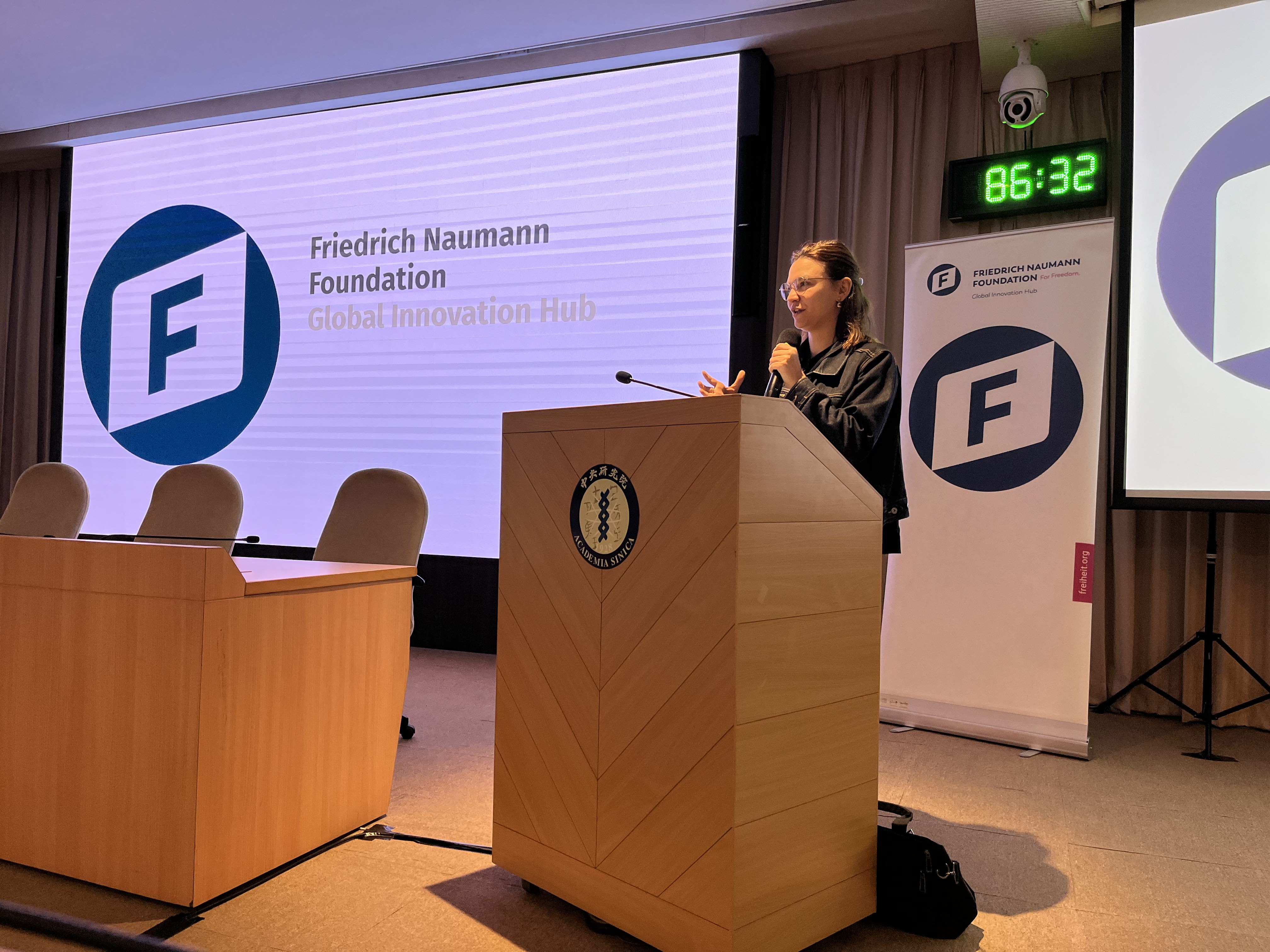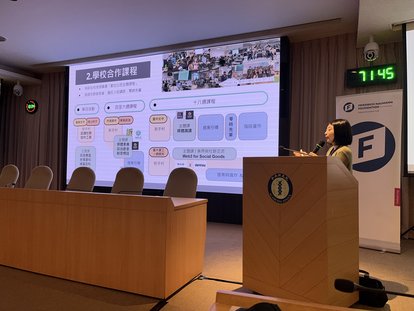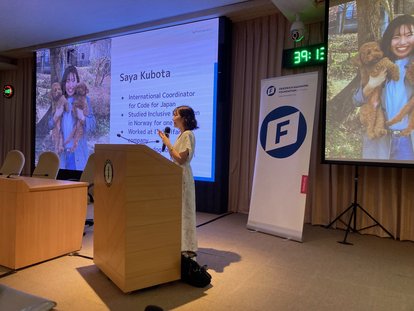Event
What Kind of Digital Citizenship Education Do We Need for the Future?

Céline Nauer – Project Advisor at FNF Global Innovation Hub
© Global Innovation HubOn May 4, 2024, the FNF Global Innovation Hub co-organized Digital Citizenship Education Expert Talk and World Café discussion with g0v jothon and g0v sch001 at the g0v summit, one of the world's premier civic tech events. The summit attracted hundreds of participants such as members of civic tech communities, educators, students, political workers, and enthusiasts of democracy and technology from around the globe.
The Hub was honoured to hold our event there with our partners—g0v jothon and g0v sch001 because that enabled us to see how German, Japan, and Taiwan’s civic tech communities actively and responsibly initiate innovative programs to fill the lacking part of digital citizenship education in the school system. We also thank our partner for inviting Céline Nauer, our Project Advisor to introduce the work of the Hub.
The Hub also felt grateful to return to g0v summit again after 2020, when we co-organized g0v summit with g0v jothon. We were happy to see g0v, such a model of innovation for democracy, to consciously grow in these 4 years.
Here we would like to share with you what we learned and achieved during our Expert Talk and World Café discussion:
Expert Talk: Experiences and Insights on Digital Citizenship from Germany, Japan, and Taiwan
At the Expert Talk, Kubota Saya, International Coordinator of Code for Japan, Sonja Fischbauer, Organization Development Specialist and Community Strategist at the Open Knowledge Foundation Germany, and Tiff Lin, a contributor to g0v sch001 were invited to present their experience. They demonstrated their strategies, initiatives, and programs for advocating for digital citizenship education. Based on their first-hand experiences of implementing these programs, they further analysed various challenges and offered policy recommendations on how to strengthen digital citizenship education. They also showcased youth-led civic tech projects and a general picture about young people’s participation in their digital citizenship education initiatives.
G0v Sch001 from Taiwan: Empowering Students and Teachers through Digital Citizenship Education

Tiff Lin– Contributor for g0v Sch001
© FNF Global Innovation HubTiff Lin, contributor of g0v Sch001, emphasised the importance of providing a learning network for students. Such network should offer students a comprehensive learning cycle in and outside of school: from providing courses, raise students’ awareness to public participation, encourage them to apply what they learn by implementing a civic tech project, and offering project incubation support such as mentorship and consultation from experienced experts, technology resources, and establishing inter-disciplinary communities for them.
After walking through this learning cycle, students can become an expert on civic tech who are able to contribute back to this learning circle and civic tech community. Most importantly, they will be empowered by the learning cycle: they are confident that they have the strength to solve a problem by utilising technology and collaborating with others.
G0v Sch001, for example, can serve as a blueprint of such a network, as Lin suggested. G0v sch001 is a school without walls initiated in 2019 by members of g0v and people who are committed to strengthening digital citizenship education for young people. Until now, they have offered more than 65 online courses for free and incubated more than 100 civic tech projects initiated by students and participants of courses. Members of g0v offer teaching resources to those online courses, mentorship, and technical support for incubating student’s projects.
Lin emphasised that such a learning circle built by g0v sch001 aims to cultivate students’ abilities of problem-solving, human-machine collaboration, and interdisciplinary cooperation. Last but not least, they hope students can be inspired to become an active and responsible citizen who is willing to take steps by themselves to solve common challenges in our society.
What is the feedback from students? Lin shared that g0vsch001’s survey shows that the number of projects proposed by students are rising each year, and their topics are more about integrating and matching learning resources, such as various activities, open courses, experimental education information, university courses evaluations, and so on. The survey also shows that the top two reasons drive students to propose a project in g0v are: it enhances their own ability and fulfils their pursuit of contributing to society and self-fulfilment.
However, an ideal program should not leave existing education systems and teachers behind. Lin introduced that g0v sch001 collaborates with schools to integrate civic tech education into the curriculum. These collaborations can take various forms, such as single-day workshops, multi-week courses, and even eighteen-week programs. They work closely with teachers, providing the methods and tools for initiating civic tech projects, and mentorship from long-term g0v participants.
As for teachers, g0v sch001 also offers training and workshops for them. Some teachers also initiated their own civic tech projects. For example, Ms. Chung-mei Han, a teacher at National Chutung Senior High School, initiated the Road-safety for Everyone project and used her projects as a basis to optimise her “Problem-solving “class.
Code for Germany: Encourage Students to Tackle Societal-political Problems with The Help of Technology

Sonja Fischbauer – Community Strategist and Organisational Development Specialist at the Open Knowledge Foundation Germany
© Global Innovation HubFischbauer introduced Code for Germany, a network focused on civic tech, open government, and open data initiatives, and their pathway on digital citizenship education.
Starting from 1980, the beginning of development of civic tech has been motivated by strong political expectation: civic tech activists hope that through the use and advocacy of open data and digital participation tools, governments in Germany can be more transparent and accountable, as introduced by Fischbauer. This legacy and spirit are carried out by German civic tech communities and is continuously passed on to their digital citizenship education program. Fishcbauer also stressed that digital citizenship education should not only be something about technology and career development but also empower young people to know how to use digital tools to participate in politics and to foster democracy, human rights, and all the progressive values that matter to the society.
Fischbauer mentioned Jugend Hackt (youth hacks) as an example on how German civic tech community initiated digital citizenship education. Jugend Hackt is a program established in 2013 by mediale pfade.org – Verein für Medienbildung e.V and Open Knowledge Foundation Deutschland e.V., the leading civic tech organisation in Germany. Through hackathon events in different regions, local workshops, an online community, and exchange programs with countries like Japan and Korea, the program encourages students to find solutions to social-political problems, environmental issues, lack of responsibility of some local government, etc. by using digital tools. The program also aims to cultivate young people’s consciousness about using technology responsibly.
Code for Japan Story: Let’s Encourage Citizens to Think and Act Together

Saya Kubota, International Coordinator for Code for Japan
© FNF Global Innovation Hub“A society that thinks together and builds together.” That is Code for Japan’s vision quoted by Kubota in her Talk, and it clearly demonstrated the goal of their digital citizenship education program. With 80 brigades across the country, Code for Japan is able to initiate digital citizenship education programs in different areas in Japan. Kuboda introduced them as follows:
- Digital Citizenship Workshop
Kubota introduced that the Workshop, held in Kakogawa Higashi High School and Hamamatsu Nishi High School, aimed to inspire students to use technology to solve societal problems by starting from local issues and to cultivate students’ sense of responsibility and activeness to public affairs in their hometown. The workshop received positive feedback from participants.
- Civic Tech Challenge Cup U-22
Since 2020, this competition invites students to identify social issues and create prototypes to address them. An inspiring example is the Voice Editing Service for People with Stuttering, the project built by the Bear Tech team, which won the competition in 2023. The competition provides a platform for young innovators to showcase their ideas and solutions to not only the public but also student community, civic tech and open source communities such as Code for Japan, and engineering and professional community. Such a platform helps students to build up their supporting network of career development.
Policy Recommendations for Strengthening Digital Citizenship Education
During the talk and the question-and-answer session with the audience, Fischbauer, Lin, and Kuboda proposed the following recommendations on what we can do to facilitate digital citizenship education:
- Enhance the Inclusiveness and Accessibility of Such Programs
The three experts all agreed that we can do more to make our education programs more inclusive and accessible to participants with different ages, genders, identities, knowledge background, family condition, and motivations.
Fischbauer mentioned that we should make it more attractive to more non-cis male participants to improve the gender diversity of participants and programs. She also emphasised that we should not let participants be deterred by a wrong image that they must learn how to code or they will not be allowed to join in this program.
Tiff also pointed out that students with high learning motivation usually participate more actively in the program, and that also reminds her of thinking about how to incentivize students with low learning motivation.
Seeing from the perspective of students, Kuboda shared that the sense of belonging is very important to young people if we want them to continuously participate in a program. That’s why the inclusiveness of our program is essential.
- Develop Intergenerational Education
Kubota and Lin both proposed that we need to develop digital citizenship education for adults. Civic Tech Communities, such as g0v and Code for Japan, have already been great learning environments or adults. Moreover, such education should also extend to the elderly since they also encounter new challenges when technology is fast evolving. For example, Kubota mentioned that nearly 30% of Japan's population is over 65, making it crucial to include the elderly in civic tech initiatives.
In addition to expanding education to the older generation, both experts stated that intergenerational exchange is also important to young people. In this way, young people can really be offered a chance to expand their network and to broaden their visions through interacting with civic tech community members who are already professional or belong to different generations. Lin also mentioned that the best way to encourage young people to participate is not to create a new “young g0v” but to think about how to lower the participation barrier of the existing g0v community for young people.
- Increase Resources and Support to Civic Society and Teachers
Experts all mentioned that the digital citizenship education initiated by civic tech communities need more funding and resources. Such programs are based on voluntary contributions from civil society, but the problem they are solving is nation-wide and caused by the lack of such education in the school system, so they definitely need more support and funding from governments and private sectors. However, Fischbauer reminded us that the civic tech community should also strive to ensure that projects do not become overly influenced by these funding sources.
Lin illustrated that we need more resources and institutional support for capacity building for teachers in the educational system. Although g0v sch001 has offered training and teaching resources to teachers, sometimes teachers will still worry whether g0v sch001’s project-based learning method will be beneficial to students or operable in the school education system. To address these problems, governments will need to consider how to adjust the current school and grading system to recognize students’ achievement in creating civic tech projects. Also, g0v sch001 will need more teachers with abilities and effort to operate project-based learning.
Following this expert talk, the World-Café discussion on digital citizenship education was held in the evening and gathered many citizens’ practical and in-depth recommendations and ideas.We will share them in the next post-event report, please stay tuned to our website.

